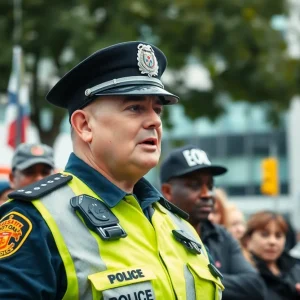Asheville Police Reinforce Commitment to Officer’s Mental Health in Wake of Recent Shooting Incident
In the serene city of Asheville, North Carolina, police shootings are not commonplace. Yet, the psychological aftermath of such events can be immensely taxing for the officers involved. As such, the Asheville Police Department (APD) underscores its stern focus on officer’s mental health in the wake of the first officer-involved shooting this city has seen in years.
Officer-Involved Shooting Unsettles Asheville
The peaceful community of Asheville was recently stirred by an incident that took place on Tuesday, August 27. Chad Herman, a 58-year-old local man, brandished a firearm at police officers and bystanders near his residential property. Despite repeated calls to drop the weapon, he refused. In response, and to safeguard themselves and the bystanders, police took the last resort action — Herman was shot and subsequently succumbed to his injuries.
APD’s Peer Support Team: A First Responding Aid for Trauma
In the shocking aftermath of such incidents, officers on duty frequently go through intense physical and psychological pressure. Police Chief Mike Lamb, who had himself been a part of such a dire situation in 2018, admitted to the harrowing nature of these events.
“It’s a traumatic situation,” Lamb confessed, “So we have several systems in place that help offer support to the officer and also to the other officers that were on scene as well.”
Central to these supportive measures is the APD’s peer support team. Commanded by Lt. Diana Loveland, the group draws its members from varied ranks within the department, spanning officers to captains. These members are meticulously trained to provide emotional and mental assistance to their counterparts who have encountered critical incidents.
Officers Offering Support to Officers
Emphasizing her team’s role and function, Loveland clarified that they are not trained psychological experts. Nonetheless, their experiential knowledge makes them a great resource for comforting their fellow officers. “Talking to a friend who’s never been to a critical incident won’t have the same kind of compassion or understanding of what they’re going through,” she expressed.
Recognizing and Addressing the Stressors
According to Loveland, their peer support is not just about offering counsel, but also about helping officers understand that it’s completely normal to feel shaken after such incidents. The support team’s role also includes guiding officers when to seek professional help for their stress.
The Future: Prolonging Careers in Law Enforcement
Acknowledging that peer support can offer long-term benefits in terms of career longevity, Loveland stressed the importance of officers understanding how to manage their stress levels and cope with critical incidents. “Knowing how to deal with your stress and knowing how to deal with a critical incident has helped to prolong officers’ careers,” she explained.
In conclusion, APD hopes its proactive approach in ensuring that the officers feel cared for and understood will cultivate a sustainable and supportive culture within the department. This is especially important in times of unexpected incidents that could potentially yield traumatic experiences for those who pledge to serve and protect the community.
© 2024 Inc. Terms Privacy Policy Cookie Preferences






